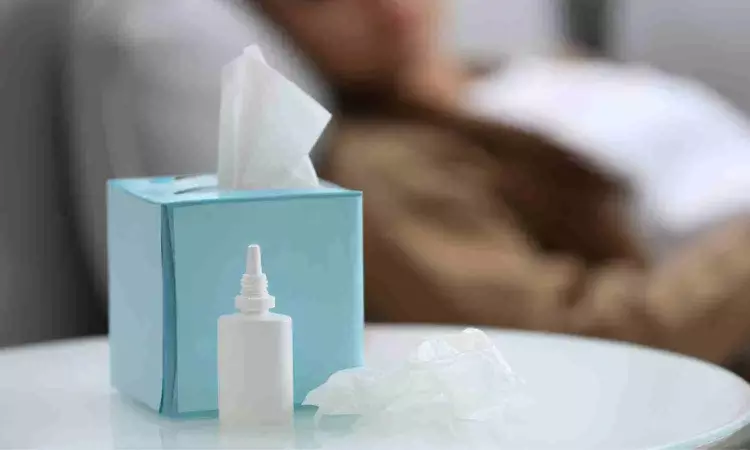- Home
- Medical news & Guidelines
- Anesthesiology
- Cardiology and CTVS
- Critical Care
- Dentistry
- Dermatology
- Diabetes and Endocrinology
- ENT
- Gastroenterology
- Medicine
- Nephrology
- Neurology
- Obstretics-Gynaecology
- Oncology
- Ophthalmology
- Orthopaedics
- Pediatrics-Neonatology
- Psychiatry
- Pulmonology
- Radiology
- Surgery
- Urology
- Laboratory Medicine
- Diet
- Nursing
- Paramedical
- Physiotherapy
- Health news
- Fact Check
- Bone Health Fact Check
- Brain Health Fact Check
- Cancer Related Fact Check
- Child Care Fact Check
- Dental and oral health fact check
- Diabetes and metabolic health fact check
- Diet and Nutrition Fact Check
- Eye and ENT Care Fact Check
- Fitness fact check
- Gut health fact check
- Heart health fact check
- Kidney health fact check
- Medical education fact check
- Men's health fact check
- Respiratory fact check
- Skin and hair care fact check
- Vaccine and Immunization fact check
- Women's health fact check
- AYUSH
- State News
- Andaman and Nicobar Islands
- Andhra Pradesh
- Arunachal Pradesh
- Assam
- Bihar
- Chandigarh
- Chattisgarh
- Dadra and Nagar Haveli
- Daman and Diu
- Delhi
- Goa
- Gujarat
- Haryana
- Himachal Pradesh
- Jammu & Kashmir
- Jharkhand
- Karnataka
- Kerala
- Ladakh
- Lakshadweep
- Madhya Pradesh
- Maharashtra
- Manipur
- Meghalaya
- Mizoram
- Nagaland
- Odisha
- Puducherry
- Punjab
- Rajasthan
- Sikkim
- Tamil Nadu
- Telangana
- Tripura
- Uttar Pradesh
- Uttrakhand
- West Bengal
- Medical Education
- Industry
New potassium channel blocker nasal spray may reduce severity of Sleep apnea, finds new research

Australian researchers have discovered that a new potassium channel blocker nasal spray at bedtime has the potential to reduce the severity of sleep apnea in people and lower their blood pressure.
The new research published in The Journal of Heart and Circulatory Physiology offers hope to millions of people around the world affected by sleep apnoea, a common and debilitating chronic respiratory condition.
“Obstructive sleep apnea (OSA) is a sleep disorder where the muscles in the back of the throat relax and the upper airway narrows or collapses, restricting oxygen intake and causing people to wake repeatedly throughout the night,” says Professor Danny Eckert, College of Medicine and Public Health.
“It has been linked to a variety of medical conditions including cardiovascular disease, stroke, obesity, diabetes, anxiety and depression.
“Treatment options are limited and while continuous positive airway pressure (CPAP) machines are a proven treatment for OSA, around 50 per cent of people struggle to tolerate them,” he says.
The aim of the study was to determine the effects of a new potassium channel blocker nasal spray on OSA severity and to investigate the potential influence of different breathing approaches such as restricted ‘nasal only’ breathing and the physiological characteristics of those who had a favourable response.
“Potassium channel blockers are a class of drugs that block the potassium channel in the central nervous system.
When used in a nasal spray, the blockers have the potential to increase the activity of the muscles that keep the upper airway open and reduce the likelihood of the throat collapsing during sleep,” says lead author Dr Amal Osman.
Using a randomised, blind trial, 10 people with OSA were given either the potassium blocker nasal spray, a placebo nasal spray or the potassium nasal spray in combination with restricted ‘nasal only’ breathing.
Seven out of the 10 people responded to the potassium channel blocker nasal spray showing a reduction in the frequency of upper airway collapsing episodes during sleep and lower blood pressure the next morning. The use of the spray with restricted ‘nasal only’ breathing did not improve quality of sleep in this trial.
“What we have discovered is that the nasal spray application of the potassium channel blocker that we tested is safe, well tolerated. Those who had a physiological improvement in their airway function during sleep also had between 25-45% reductions in markers of their OSA severity including improved oxygen levels as well as a reduction in their blood pressure the next day,” says Dr Osman.
“These insights provide a potential pathway for development of new therapeutic solutions for those people with OSA who are unable to tolerate CPAP machines and/or upper airway surgery, and those with a desire for alternatives to existing therapies,” says Professor Eckert.
“Right now, there are no approved drugs for treating OSA, but through these findings and future research we are getting closer to developing new and effective drugs that are safe and easy to use,” says Professor Eckert.
Reference:
Amal M. Osman,Barbara Toson,Ganesh R. Naik,Sutapa Mukherjee,Martina Delbeck, A novel TASK channel antagonist nasal spray reduces sleep apnea severity in physiological responders: a randomized, blinded, trial, The Journal of Heart and Circulatory Physiology, https://doi.org/10.1152/ajpheart.00541.2023.
Dr Kamal Kant Kohli-MBBS, DTCD- a chest specialist with more than 30 years of practice and a flair for writing clinical articles, Dr Kamal Kant Kohli joined Medical Dialogues as a Chief Editor of Medical News. Besides writing articles, as an editor, he proofreads and verifies all the medical content published on Medical Dialogues including those coming from journals, studies,medical conferences,guidelines etc. Email: drkohli@medicaldialogues.in. Contact no. 011-43720751


